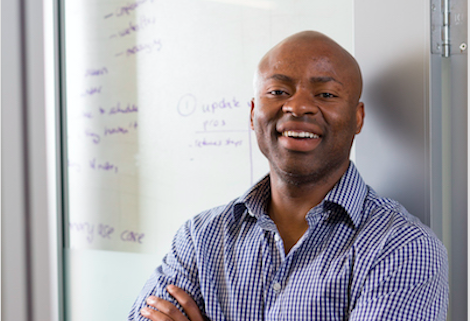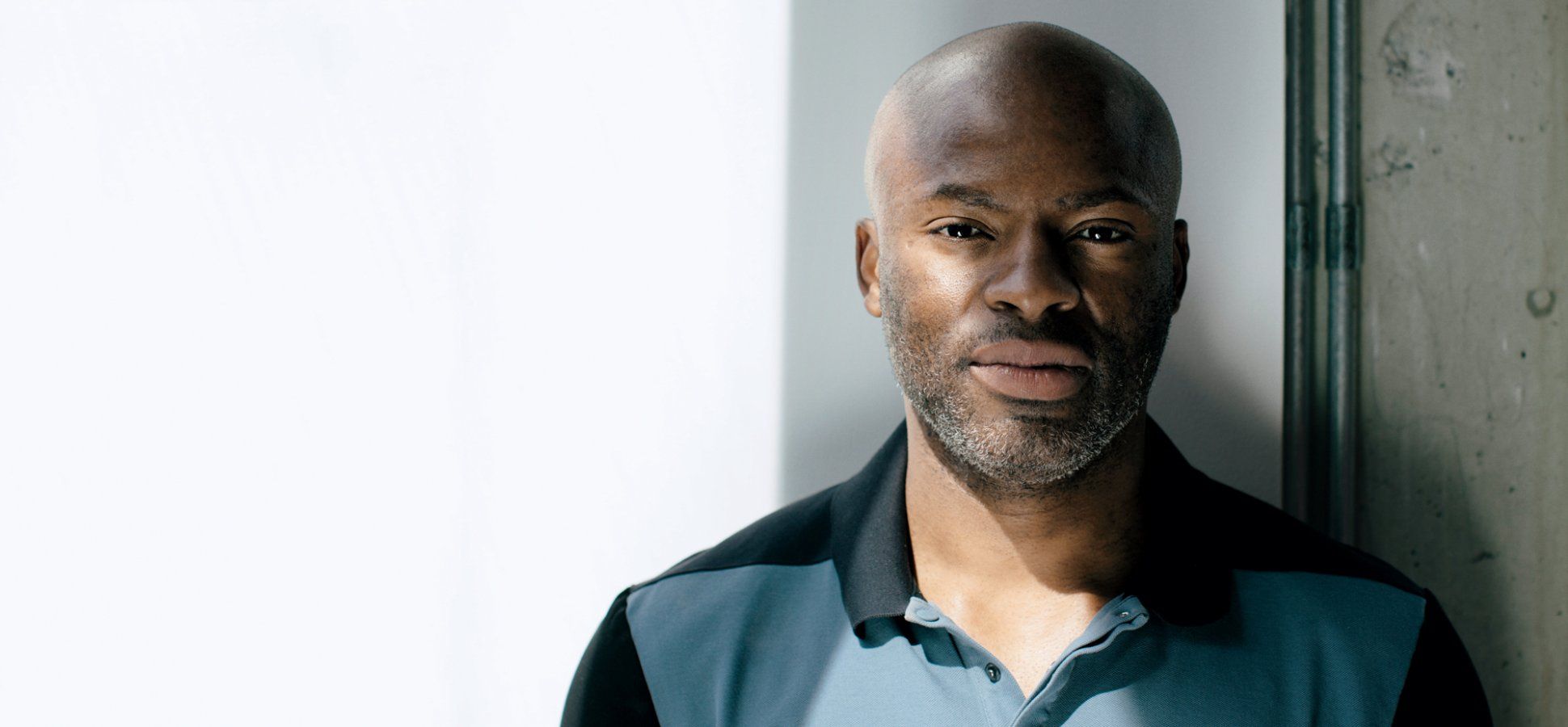I’m sure you’ve used or heard of Calendly.com and if you haven’t, get ready to meet its founder Babatope (Tope) Awotona. Calendly is a scheduling appointment tool that lets customers book their own meeting times while helping you say goodbye to scheduling conflicts. Recently, Calendly raised a $350 million investment, valuing the startup at more than $3 billion.
Tope sat down with us to share his journey founding this company with 10+ million monthly users. He challenges the idea of what an ‘overnight success’ is and shares his thoughts on what it’ll take you to do the same.
Get into his article below!

What do you want to say to American or non-American millennials that are in the pursuit of financial freedom and entrepreneurship?
It feels like as recently as five years ago, entrepreneurs were mostly thought of as dreamers or crazy people.
But over the last five years, there’s been a huge change because of the rise of remote work, co-working spaces, the gig economy and even shows like Shark Tank. I say all of that to say, There's never been a better time to start a business and bet on your ideas.
So yeah... I guess the first thing I would like to more or less share with people is that it's a great time. And, there's a lot of content out there. And whether it's what you guys (Mogul Millennial) are doing, or a podcast...there’s just a lot of content out there for people for aspiring entrepreneurs to learn, grow and scale their business.
It's a very exciting time. And I think all aspiring entrepreneurs seize the opportunity.
So basically, there's no excuse for anyone to fail, because there's just so much free resources out there right now….
People will still fail.
But they should not let those failures hold them back. Right?
And more importantly, when they and if they fail. Again, I guess the most important thing is not failing for the same reason, multiple times.
So just learning from those experiences.
But yeah, I think that entrepreneurship has never been more accessible than ever. And it's never been more celebrated than at any point. At least that’s what it feels like.
What is imperative for millennial entrepreneurs that are starting this journey to know?
Yeah, so I think first and foremost, it seems that in some ways Calendly seems like an overnight success, right?
The reality is Calendly has been around for over seven years.
In each successive year…. it’s gotten bigger, and reached more people.. But it's really been a journey of seven...years.
So it is a long journey and granted it doesn't have to take that long for everybody. But it is generally a long process, and that's why passion is needed.
So I know you plan on asking me, when did it become much more than just making money..? And to answer that I think it's the point in which you realize the journey to creating something that's impactful, something that serves people, something that you know, people are willing to open up their wallets and pay for - is not something that you can do just for money.

There has to be much more that drives you than just money.
Obviously, money is an important thing, right? If that's not properly accounted for you won't be in business for very long.
So to summarize it's a long journey.
So even if you look at the time I spent working on Calendly, it took over seven years for the rest of the world to learn about Calendly.
And then before I ever got the opportunity to work on Calendly, first, I had to fail five different times. Before I got the opportunity to fund Calendly, I had to do the corporate jobs that I had before really well.
So this journey of Calendly that you know as a business that’s helped hundreds of millions of people, it really started 20 years ago when I left college.
So the first step was taking those jobs that I had, doing them really well and them allowing me to grow and get other opportunities. Then saving that money, and really putting myself in a position in which I could constantly grow and learn.
Whenever I felt like I wasn't in a place (in a role) where I couldn't learn more, I always sought out new opportunities…
So long story short, it's a long process, and the process is not linear. =
Too often I see people who want to be entrepreneurs, and they haven't really done what I call ‘sampling’.
So how do you Sample? You ‘sample’ by working in different industries and working in different roles.
For example, you start working in sales and gradually move from sales to support to understand that different part of the customer’s journey or even from support to product, right?
You should take on ‘a tour of duty’ within different roles within a company, and also within different industries.
So from this, then you’ll have this very broad base of knowledge and you’ll begin to kind of build your business acumen.
So those are the things I think are not talked about enough and that is why it is a journey.
It's not exactly linear….
And you always want to put yourself in a position in which you're learning.
And the last point is that each step you take kind of really matters. So, for me to be able to get to the point in which I was able to, you know, bootstrap and start Calendly - I had to do well at each and every one of the jobs that I had. It's what allowed me to have the nest egg to build the business.
At the end you’ll realize that whatever you're doing matters. And if you feel like it doesn't matter, that's probably your hint that you should do something else which allows you to feel like you're working more and it’s towards your goals and dreams.
It’s important to highlight the fact that overnight success can be elusive potentially. Starting a company is not easy. Actually one of the first quotes I jotted down to ask you about was when you mentioned it being an emotional roller coaster…..
And by the way, that's even when it's going well, right, lol. For me, actually, since we're on that topic... that's actually been the hardest part.
When you start something and it's not going so well….that part for me, it wasn't as stressful as growing and serving people.
Because here's what happens - the more successful your business is, the more people both internally and externally that you have to make happy and balancing the needs of everyone becomes exponentially tougher. There can be times when you take it personally because you feel like you can’t make everyone happy. The flipside of this is you’re honored by the trust they all place in you and wanting to win for all these people brings out the best in you. You might even come to find out like I did that winning for people who bet on you is just as exciting as winning for yourself.

Switching gears a bit...you were previously quoted saying that millennial entrepreneurs need to fully understand the problem before they start.
You said that a lot of people don't do that...
I actually have one very specific piece of advice I give people.
So with a lot of the businesses I started, you know, there was a lot of confirmation bias in my research.
So you spot an opportunity, you think that this area is underserved, something better needs to exist, and you get so excited about it, that without even realizing it, you're only seeking out information that supports, you know, this position that you already have.
However, one of the things I did differently with Calendly that I think allowed it to have a much better outcome than some of these other businesses is that I spent just as much time looking to prove the idea as I did trying to disprove the idea.
So imagine you come up with this idea that the world needs a better steak knife, right?
What most people do is they spend 40 hours, or however amount of time only looking for information that supports this idea. Right?
I say if you spend 40 hours looking for information that supports the idea, make sure you spend at least 40 hours looking for all the reasons not to do it.
And if at the end of the day - after you've completed 80 hours of weighing both sides - you’ve found that there's stronger evidence to support the reason to do it, and you should go for it.
So kind of like proving out the concept?
Yeah. But also actively disproving the concept too.
So to touch on your character traits or even your background .... What was it about your background that sort of differentiated you from your classmates and peers?
I think, you know...when I think about the things that are different about my background, first and foremost, I just know I was born into a great family, right?
I had no hand in that, but I just had, if you ask me, the best parents in the world.
Their personalities were highly complementary to each other.
My dad was the dreamer and he had a lot of big ideas. And I got a lot of the risk-taking abilities from him whereas my mom was more conservative and not so much a risk-taker but she was extremely disciplined and had great instincts.

So being able to be a disciplined risk-taker, imagine how good a combination that is, lol?
So I feel grateful just because of the family I was born into.
What I think was different about me, if I compare myself to some of the people like my classmates or the people that I grew up with, is I was always a very curious person to the point that it was really annoying to a lot of people I was around because I would ask a lot of questions.
And also, I was a very impatient and ambitious person.
So I ended up skipping two grades, and because of that my classmates were two years older than me.
I ended up graduating high school at age 15.
Whereas most of my classmates were 17 or 18. So, from day one I was a very impatient person like things couldn't happen fast enough for me. It's probably some form of innate quality lol or you could say, a character flaw maybe?
If you asked the people closest to me - they would likely say ambition and a restless mind.
So...I think just going along this thread, when did it change from being much more than the money and what was that change?
So what really created that change was, after each of those businesses that I started, I think what I inevitably really discovered was that for the business to really succeed I needed to make some serious serious investments.
Meaning I needed to invest time and energy to really grow and scale those businesses.
And so, I guess once I realized it was a much bigger investment than I had originally thought it would be. Meaning almost needing this to be an all-consuming thing, or you know, maybe that all-consuming is not the right word, but it was going to be this big investment… I needed to have much more than money to motivate you.
Because what happened was I would get into starting businesses and then I would find out okay, there's some initial reception to this and it's positive. But to really scale it, I have to go learn and become fluent in this new thing...in this new topic...in these new areas….and I just found out that I wasn't passionate about those things.
So [for example] I sold projectors, I sold Home and Garden equipment.
But I realized that for the business to be really successful, I truly needed to learn what makes people want to buy those things.
But it was not really a topic that was stimulating to me.
Whereas if you fast forward to Calendly I was more obsessed with solving that problem that people had more so than I was monetizing the problem.
Don't get me wrong, you know, the company monetizes very well today and will continue to do so. Because it's the best way you can serve your customers and your employees for a long time.
But first, I was obsessed with the idea of solving this problem.
Whereas when I look at the other businesses I started, first, I spotted an opportunity to make money, and I acted on that.
Versus acting on an opportunity to solve a problem that was kind of annoying and vexing for the world.
Perfect. Thank you so much for sharing that. What has been your most joyful period of growing Calendly?
Man, you're part of it!
I mean, I think the fact that I'm here connecting with you and you’re an actual user.
So being able to see something that I put a lot of blood sweat and tears into and it’s making other people more productive.
I think that's the ultimate gift, right? It's the ultimate joy you can get out of something you put your blood, sweat, and tears into. And on top of that people actually like it. It's helping them. It's helping them make more money. It's more efficient. It's helping them solve their customer’s problems or serve their customers better, create a better candidate experience, whatever it may be.
That's the ultimate joy.
So for me, I've been in situations where…
I've told this story a million times now and I'm sure I'll tell it a million more... I was in Tokyo last year, and I happened to share an Uber with a guy and we strike up a conversation about what we do.
I told him I started this software company. And he's like, what is it? And I’m like Calendly and he’s like I use Calendly. So that's kind of nice right? All the way across the world. Just a random guy that I get an Uber with. So that's been exciting and never gets old.
Okay, I'm glad it never gets old because guess what? Everyone I know uses it. All my friends are entrepreneurs and they use it. No one does NOT use it lol.
I love hearing that lol.
Well, if you could, touch on the time in between the unfortunate failure of the Grills company and Calendly? Could you walk us through that period in time for you?
So what I ended up doing was I basically took a break from starting new businesses.
I realized that everything I've done up until then was good in the sense that I made a lot of progress, I learned a lot more about what I needed, about what it took to start and grow a business…
But I realized that... I guess going back to the point I made earlier...is that I realized that I needed to start businesses, not because the world needed something, but because I wanted to start a business.

And so I determined that to be successful, I needed to start a business in a more organic way.
So how do you look to solve problems that truly exist, as opposed to problems that you are making up or you're making up because you just want to start a business?
How much time was that period? And what did you do mentally? Because I could imagine that that may have felt a bit sad.
How long did it take for you to say, Okay, I'm gonna start again...or find the problem to start again…?
I think that period would have been somewhere around a year, year and a half, I'm guessing.
So keep in mind that with all the different businesses that I started, I never stopped my full-time job. So I was working full time.
And you know, a lot of people have different hobbies, right? For me, I ended up cutting out a lot of my ‘hobby’ hobbies, and you know, starting businesses became my hobby.
So that was my part-time passion.
When did it change for you? When did that become your hobby?
I got to the point in which I felt like, you know, I've worked for a lot of great companies. I've worked for a lot of great people. I've learned a lot in that process. I think I can do it.
I felt like I was ready to kind of start that journey and I was ready to put my money where my mouth was. I was ready to bet on myself.
And then so during that sabbatical, I wasn't actively, you know, looking at ideas.
I was just doing my job to the best of my ability.
And one day I'm doing my job and to me, it was taking too many emails to schedule this meeting lol and I guess the rest is history from there. Maybe not.
Yeah. No, but I think a lot of times that happens, it's like, it just happens. And it could just be a perfect moment. And you know, people call it different things - serendipity etc.
Also #1 I felt knowledgeable about the problem and #2... I was passionate about becoming much more knowledgeable about the problem...
Perfect, thank you. It seems like you pivoted twice, three times actually. What were your finances like prior and during starting? How much did it take to start your businesses?
So first and foremost, over the years as I was working on my different jobs, and we’d have great quarters, in sales, I would just save my money.
That allowed me to take risks and start businesses.
The first couple of businesses I started before Calendly - the kind of money I put into them - were all negligible, like relative to my savings at the time, so none of them was risky enough to where if it didn't take off, I would lose life changing money.
So on average, I would say, I put about $15,000 into them..
And that's cash, right?
Cash Money. Okay.
Whereas Calendly I put close to 20 times that in there. And so Calendly was a huge, huge, huge bet. And it would have ended up really very poorly if it didn't work out.
Was that a mixture of cash and other forms of...financing?
It was cash, and I took out some loans as well. Maxed out credit cards. Went all in.
Oh my god. No idea. Now this is such a big thing that people don't talk about.
So, in terms of the loans, are these like, business loans? Can you just break that out?
It was a combination of personal and business.
How has been your experience starting a business in America?
For me, I've never started a business anywhere else, so I can’t compare it to another country.
My feeling is that there's no better place to start a business.
I think one of the great things about America is that somebody like me, a foreigner with a strange name...can come from nowhere, and really commit myself to learning, be willing to take the risk to start something new and succeed.
So I think that our culture in America embraces people taking risks and it rewards them.
Also, the atmosphere in the country is very conducive to commerce from our laws, regulations and our attitudes.
What would you say was your biggest pitfall if you had to give one?
We talked about passion and that would be it.
I made the mistake of picking projects based on money-making opportunities vs picking things that align with my passion. That was a pitfall of mine.
And like I said that shows up as not having the interest, energy, and ability to follow through.
I didn't have enough passion to kind of see the idea through.
But as I go through, as I look back on all those different opportunities that I had...I recognized opportunities relatively early, but the people who actually stuck it out and built those businesses and capitalized on those trends had passions for them and a lot of those people made out really well...
One of the first businesses I started was online dating.
And while that business itself didn’t take off, if you look at online dating space today, it's only grown like crazy.
From Tinder to the whole Match Group and all the different portfolios that they have…
So online dating has just become huge in the last 10 years.
There's no guarantee that what I started would have gotten big or I would have done really well, but we'll never know because I gave up too soon. And so follow through is incredibly important.
Who backed you up with Calendly, in the beginning, when people didn't really believe in what you were building? And how should millennials identify these supporters in their own lives?
My close family and friends were definitely my support team…
And in terms of identifying supporters in your own life….
I think It's always important to qualify feedback that you get, meaning what makes this person qualified to give me this feedback?
If somebody whose risk-averse, and has never taken any kind of risk in their life is telling you that entrepreneurship is a risky proposition and that you shouldn't do it, then it's important to know what this person's viewpoint is.
If they've never taken a risk in their life, maybe they're not the best person to listen to.
If you have somebody who's on the complete opposite spectrum of that, and they're giving you feedback then I think you should pay more attention to them.
But I guess in any event, there's an element of truth to every piece of feedback you get.
The important thing is to figure out what is true from what they're telling you, and what you should do with that information.
Is there any way to identify that potential risk? How can you mitigate that risk?
Also, I think your supporters are sometimes too kind when they really should be more critical. I think your detractors are generally too harsh. But there's truth to all of that. And I think you’ve got to pay attention.
What are your thoughts on serendipity or luck?You mentioned that a tweet was what ultimately led to your first investment, and catapulted you into your next growth phase with Atlanta ventures.
Yeah, so I think there's luck all over the place but you can't get lucky if you don’t yourself in the arena.
So, first and foremost, you have to put yourself in a position to be lucky. You won’t know when you will be lucky or what that stroke of luck will be.
There were many points where I was lucky with Calendly. Regarding the tweet that helped raise the first round, that was definitely luck. Even though ultimately, I think that I would have found the capital for the business lol. But to be serious, there is value in having the funding sooner and scaling sooner than later. So that was one stroke of luck.
However, I think, one of the luckiest things that happened with Calendly was not so much raising money.
It was in the early days, I had made a decision to make the product one hundred percent paid.
So you would have a sign up for a 14-day trial and after the 14 days, you pay for it.
What ended up happening though was that I had enough money just to fund the development of the product but without the billing enforcement.
So I had no way to charge people and enforce billing.
And so the product became 100% free and by the product becoming 100% free it allowed it to grow much faster than it would have if I made it 100% pay. So that's a good example of luck that I couldn't have planned but it ended up being one of the most important things that happened.
I think the most important thing about this is - yes, there will be luck. But you also have to learn from your luck as well.
So, in this case, the product ends up growing much faster because it's free. But learn from that so, until today, the product has a freemium model.
Perfect….so we're going to dive into race. I know you said that your background is what you make of it and it can be an asset or an excuse. So what practical or not so practical tips do you have for millennials trying to overcome this now?
So I'm going to give I guess conflicting advice.
I think the first and foremost is - as much as you - don't think of yourself as a minority in whatever way. Whether you’re a ‘minority’ because of your gender, your race, your height, etc.
Because it's some quality you possess. It's the dominant quality that most people that are doing what you’re looking to do possess. So just ignore it. Because one can't change it. Right?
And are you ready to accept the fact that your business is not going to succeed just because you're tall or short? For me, I'm not ready to accept that. And so that's the way I think of it.
I can't do anything about it anyway, so I should just ignore it and just do the best I can.
On the one hand, think of yourself as not that, you know, this minority but instead as a person, and I think the second part is just saying, hey, because I have this, this quality just means I need to double down on this other thing.
I'll give you some specific examples.
If you really like basketball, how do you play to your strengths?
For me what ended up happening with Calendly is yes, I think it's generally more difficult for minorities, whether it's, again, whether its women, whether its people of color, to raise money, there's no doubt about that. Right?
Wait, so you actually believe it's more difficult for minorities to raise money?
Yes. It's more difficult.
I thought it was easier.
I think today because diversity and inclusion is really more top of mind these days there are now people who are looking to right the wrongs, so yes if you find those people, yes, it is easy to raise from those people.
But I think if you're still looking at the general population. For example, if you walk into a top VC firm, maybe not San Francisco or New York but like here in the southeast, for example, I think its more difficult.
And it's not that you don't raise money.
You’ll raise money but maybe the terms are different.
Maybe you have five offers when somebody who's equally qualified as you has 10 offers.
And that makes a difference in terms of the final result. So, for me, I don't think that.
Also, in the early days, it makes a difference. When you are at scale, it doesn't really matter, right?
Everyone's attracted to greed, like greed motivates anybody and everybody wants to invest in you. Right?
But so like, when you're further along, it doesn't matter.
However, in the early days, when you haven’t proved yourself yet it's more difficult. In the early days of your business, VC’s are betting more on you and the potential of the idea. And so I think the pattern recognition plays more into somebody's willingness to open up a checkbook.
The more you look like somebody that they've invested in before the better chance you’ll have and the easier it is for them to kind of open up that check. And if you don't, I think it's harder for them to kind of connect the dots.
I don't think it's a conscious thing that people do. It's a subconscious thing. Having said that, I think you can play that to your strengths.
So for me, I felt like it was a little bit more difficult for me to raise money because again, it doesn't mean that I didn't raise money, but it’s because I didn't really like raising money.
And so I ended up building the best business I could without anybody's money.
And today, I'm in a very great position because of that. Right?
And so thinking about it - it ended up making me a better CEO and a better founder because it forced me to really optimize the business and the decisions I was making because I couldn't rely on external capital.
And today, Calendly is reaping the benefits of that so play to your strengths and don’t focus on you the negatives you have no control over.
What tips would you suggest for someone in their first year and so on…? Any tips you wish you would have known starting out?
- Don’t quit too soon. The first year is always the hardest. The future you that will see your idea executed by somebody else will regret it.
- It takes a village. Find a founder or CEO peer network. Aim to strike a balance between peers that are currently at the same stage and those that are a few years ahead of where you’d like to be.
- Have fun and celebrate the milestones.


